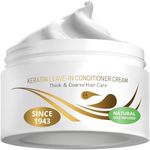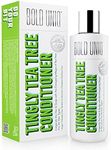Buying Guide for the Best Hair Conditioners
Choosing the right hair conditioner is essential for maintaining healthy, manageable, and beautiful hair. The right conditioner can help address specific hair concerns, such as dryness, frizz, or damage, and enhance the overall texture and appearance of your hair. When selecting a conditioner, it's important to consider your hair type, any specific hair issues you want to address, and the ingredients that will best suit your needs. Understanding the key specifications of hair conditioners will help you make an informed decision and find the perfect match for your hair care routine.Hair Type CompatibilityHair type compatibility refers to how well a conditioner works with your specific hair type, such as straight, wavy, curly, or coily. This is important because different hair types have unique needs and challenges. For example, curly hair often requires more moisture, while fine hair may need a lightweight formula to avoid weighing it down. To navigate this, look for conditioners labeled specifically for your hair type. If you have straight hair, opt for a volumizing or smoothing conditioner. For curly or coily hair, choose a moisturizing or curl-enhancing formula. Understanding your hair type will guide you in selecting a conditioner that enhances your natural texture and addresses your specific needs.
Moisturizing PropertiesMoisturizing properties in a conditioner refer to its ability to hydrate and nourish the hair. This is crucial for maintaining hair health, especially if your hair is dry, damaged, or exposed to harsh environmental conditions. Conditioners with high moisturizing properties often contain ingredients like oils, butters, or humectants. If your hair is very dry or damaged, look for conditioners with rich, creamy textures and ingredients like shea butter or argan oil. For normal hair, a balanced formula with moderate moisturizing properties will suffice. If your hair is oily, opt for a lightweight conditioner that provides hydration without adding excess oil.
Protein ContentProtein content in a conditioner refers to the presence of proteins that help strengthen and repair the hair. This is important for hair that is weak, brittle, or prone to breakage. Proteins like keratin, silk, or wheat protein can help fortify the hair shaft and improve its resilience. If your hair is damaged from heat styling or chemical treatments, a conditioner with higher protein content can be beneficial. However, too much protein can make hair stiff, so it's important to balance it with moisture. For healthy hair, occasional use of a protein conditioner can help maintain strength, while damaged hair may benefit from more frequent use.
Sulfate-Free FormulaA sulfate-free formula means the conditioner does not contain sulfates, which are cleansing agents that can strip hair of its natural oils. This is important for maintaining the hair's natural moisture balance and preventing dryness or irritation, especially for those with sensitive scalps or color-treated hair. Sulfate-free conditioners are generally gentler and help preserve hair color and moisture. If you have a sensitive scalp, color-treated, or dry hair, opting for a sulfate-free conditioner can help maintain your hair's health and vibrancy. For those with normal hair, a sulfate-free option can still be beneficial for gentle care.
FragranceFragrance in a conditioner refers to the scent added to the product, which can enhance the sensory experience of hair care. While not directly affecting hair health, fragrance can be important for personal preference and enjoyment. Some people prefer a strong, lingering scent, while others may opt for a mild or fragrance-free option due to sensitivities or allergies. When choosing a conditioner, consider your personal preference for scent and any potential sensitivities. If you enjoy a particular fragrance, look for conditioners with that scent profile. If you have sensitivities, a fragrance-free or hypoallergenic conditioner may be the best choice.


















